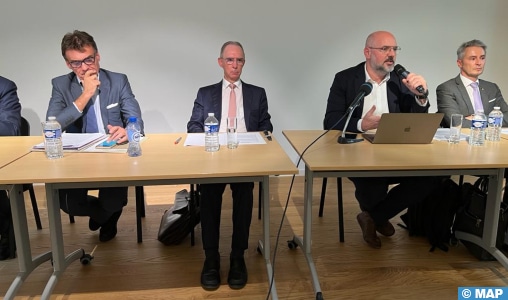Thursday, October 27, 2022 at 9:00 p.m. Updated on 10/28/2022 at 0103
Brussels – Experts in law and international relations, academics and politicians highlighted, on Thursday in Brussels, the relevance of the autonomy initiative in the Moroccan Sahara, the only way, according to them, capable of putting an end to this dispute and to ensure the stability of the whole region.
During a symposium, placed under the theme ”the Moroccan autonomy initiative for the Sahara, challenges and prospects”, various aspects related to the genesis of this artificial conflict, to the geopolitical context, to international law and to the of the application of the statute of autonomy to the Moroccan Sahara were discussed.
”In a world that needs peace and stability more than ever, the question of the Sahara cannot remain without a solution, and the autonomy plan proposed by Morocco is capable of putting an end to this conflict and bringing a hope for a better future for the population and the region”, underlined the Belgian federal deputy, Hugues Bayet.
It is no coincidence that the United States, France, Germany, Spain, the Netherlands and now Belgium have decided to take a stand in favor of the settlement of this conflict, on the basis of the plan of autonomy presented by Morocco, considering that the Moroccan project is the most serious, the most credible and the most realistic solution for the settlement of this question, pointed out Mr. Bayet, noting that Europe, in its together, is called today to follow this dynamic and reach a common decision within the European Council, in favor of the autonomy plan.
Current events, in particular the war in Ukraine and its repercussions on security and on the energy market, show that Morocco is an essential element in the European vision of the future, assured the president of the Belgian Support Committee for the Autonomy for the Sahara Region (COBESA), considering that the stability and security of this region are more than ever vital for the local populations, but also for the Mediterranean and European environment.
For Professor Francis Delperee, member of the Royal Academy of Belgium, the Moroccan proposal for autonomy in the Sahara brings peace, not only for the region, but also for the African and European continents.
”This initiative is likely to make collaboration in the economic, social and cultural fields even more effective,” said Mr. Delperee, who stressed the support of the Security Council to the Moroccan autonomy initiative.
Stressing the importance of the position of Belgium and many European countries in favor of the Moroccan initiative, he added that more and more voices are being raised to say that the autonomy project testifies to a serious and credible effort on the part of Morocco.
”Political Momentum cannot be ignored today. There is an opportunity here to seize and support this initiative,” he pleaded.
Marc Finaud, independent expert at the Geneva Center for Security Policy (GCSP), dealt, for his part, with the question of ”territorial autonomy as a means of political settlement of conflicts”, emphasizing the “serious and credible” character and on the growing support for the Moroccan autonomy plan.
According to him, the non-settlement of the Sahara issue has an impact on the stability of the entire region and prevents the Arab Maghreb Union from functioning, while there is an “enormous” potential for cooperation in many multiple areas, including the economy and the fight against terrorism and jihadism.
He, among other things, pointed to the “reluctance and blockages of the Algerian regime which is hampering the settlement of this issue, which must understand that the settlement of this issue is in the collective interest of all parties and of the entire region. ”.
In the field of law, the Moroccan plan is in principle in line with the requirements of international law, which is the international frame of reference within which the conflict must be settled, namely within the UN, underlined, his side, Pierre d’Argent, professor at the Catholic University of Louvain.
The Moroccan autonomy proposal is, he said, a ”pragmatic way to overcome the deadlock in this conflict, which has lasted too long and which is creating suffering and preventing the region’s development”.
“This plan is likely to put an end by lawful means to an ongoing situation,” he added.
Zakaria Abouddahab, professor at the University of Mohammed V in Rabat, drew attention to “the vulnerability of the Tindouf camps where a population lives in disastrous conditions”, warning in particular against the food insecurity and the links now proven between separatism and international organized crime.
”It is imperative to get out of this impasse and move towards regional integration, because without a solution, the suffering will continue and the opportunities will be missed,” he said.
According to him, it is necessary to launch an international plea in favor of the settlement of this question and to be part of the new realistic paradigm of the UN Security Council, which enshrines the pre-eminence of the Moroccan autonomy plan.
Organized by the Association ”Les Amis du Maroc”, in partnership with COBESA, the conference made it possible, among other things, to update analyzes and research on the subject, to address technical issues related to the notion of autonomy and to measure the challenges and prospects of the Moroccan Autonomy Initiative for the Sahara.
Originally published at Almouwatin.com









